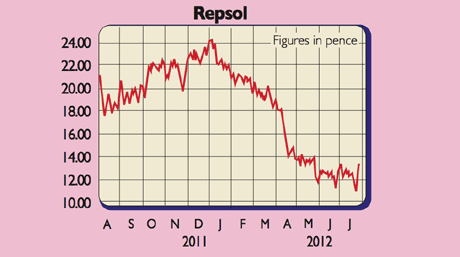Get the latest financial news, insights and expert analysis from our award-winning MoneyWeek team, to help you understand what really matters when it comes to your finances.
You are now subscribed
Your newsletter sign-up was successful
Want to add more newsletters?

Twice daily
MoneyWeek
Get the latest financial news, insights and expert analysis from our award-winning MoneyWeek team, to help you understand what really matters when it comes to your finances.

Four times a week
Look After My Bills
Sign up to our free money-saving newsletter, filled with the latest news and expert advice to help you find the best tips and deals for managing your bills. Start saving today!
The price of shares in Repsol, Spain's flagship integrated oil major, has more than halved this year. That's due to Spain's sovereign debt crisis and bad news from Argentina, where the populist government expropriated Repsol's $10.5bn stake in Argentine national oil firm YPF, robbing Repsol of more than a fifth of its earnings.
Yet there's still plenty of upside here. Repsol's upstream operations (the business of getting oil out of the ground) are the envy of the industry. Production is set to rise by 7% a year and surpass 500,000 barrels per day by 2016, with the reserve replacement rate (which measures the firm's success at finding new reserves to replace the ones it is extracting) exceeding 120%.
Most of these fields are located overseas, in places such as Venezuela and the Gulf of Mexico. Big development assets are also situated in Brazil. By contrast, the downstream unit (the business of selling oil-derived products) is focused mainly on Spain. Repsol also owns a 30.8% stake in Gas Natural (worth about €2.5bn), along with a highly-profitable liquefied natural gas (LNG) division.
MoneyWeek
Subscribe to MoneyWeek today and get your first six magazine issues absolutely FREE

Sign up to Money Morning
Don't miss the latest investment and personal finances news, market analysis, plus money-saving tips with our free twice-daily newsletter
Don't miss the latest investment and personal finances news, market analysis, plus money-saving tips with our free twice-daily newsletter
Repsol (Spain: REP), rated OUTPERFORM by Sanford Berstein.

The biggest headache (since the loss of YPF) has been net debt (debt minus cash), which is now too high. At €13.5bn (as at June), it equates to a gearing ratio of about 50%. The board is doing everything possible to maintain the firm's investment-grade credit rating. It plans to sell non-core assets and treasury stock worth up to €4.5bn.
After the $540m disposal of its Chilean liquefied petroleum gas (LPG) distribution unit a fortnight ago, €1.85bn has already been realised. Another option is to sell the LNG unit, which would slash debts related to financing LNG tankers.
On a sum-of-the-parts basis, I value the whole group at about €32bn. Deducting the debt gives a value of €16 a share. The City is pricing in a dividend cut from the current €1.16 per share to €0.90. This would still give an 8% yield, which is underpinned by robust cash flows from Bolivia and Peru, as well as restarted production in Libya.
Repsol is, of course, exposed to volatile commodity prices (oil in particular) and variable oil refining margins. It also has significant assets in various geopolitically volatile regions. Yet all in all it seems far too cheap on a forward earnings multiple of seven especially as around three-quarters of the group's worth is situated outside of Spain and should not therefore be directly affected by the nation's debt crisis.
Rating: BUY at €13.00
Paul Hill also writes a weekly share-tipping newsletter, Precision Guided Investments. See www.moneyweek.com/PGI, or phone 020-7633 3634.
Get the latest financial news, insights and expert analysis from our award-winning MoneyWeek team, to help you understand what really matters when it comes to your finances.
Paul gained a degree in electrical engineering and went on to qualify as a chartered management accountant. He has extensive corporate finance and investment experience and is a member of the Securities Institute.
Over the past 16 years Paul has held top-level financial management and M&A roles for blue-chip companies such as O2, GKN and Unilever. He is now director of his own capital investment and consultancy firm, PMH Capital Limited.
Paul is an expert at analysing companies in new, fast-growing markets, and is an extremely shrewd stock-picker.
-
 Average income tax by area: The parts of the UK paying the most tax mapped
Average income tax by area: The parts of the UK paying the most tax mappedThe UK’s total income tax bill was £240.7 billion 2022/23, but the tax burden is not spread equally around the country. We look at the towns and boroughs that have the highest average income tax bill.
-
 BBC TV licence fee hike confirmed: can you reduce how much you pay?
BBC TV licence fee hike confirmed: can you reduce how much you pay?The cost of a TV licence fee is set to rise by over 3%, but there are ways to reduce the bill.